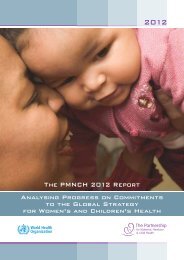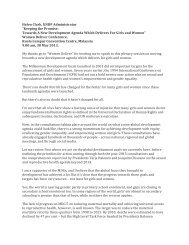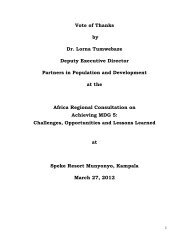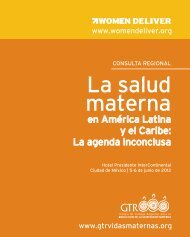State of World Population 2012 - UNFPA Haiti
State of World Population 2012 - UNFPA Haiti
State of World Population 2012 - UNFPA Haiti
You also want an ePaper? Increase the reach of your titles
YUMPU automatically turns print PDFs into web optimized ePapers that Google loves.
Relationship between adherence to dominantmasculinities and sexuality807060Men need more sexthan women doMen don’t talk about sex,they just do it57.1 58.161.2Men are always readyto have sex69.757.854.250.1 48.632.4% Agree50403025.234.326.530.741.7201000Brazil Croatia India Mexico RwandaSource: International Men and Gender Equality Survey, International Center for Research on Women & Instituto Promundo 2011are taken for granted following patterns <strong>of</strong> exclusionspecific to each setting.Across societies worldwide, expectationsdictate that sex should take place only amongmarried individuals who are healthy, heterosexual,monogamous, not too young, not tooold, and whose childbearing fulfils expectationsin their families and communities. When anyperson’s sexual activity violates any <strong>of</strong> these rigidrequirements, society makes it more difficult forthat person to access family planning education,methods and services.Human sexuality and gender relations are closely interrelatedand together affect the ability <strong>of</strong> men and women to achieveand maintain sexual health and manage their reproductive lives...Responsible sexual behaviour, sensitivity and equity in genderrelations, particularly when instilled during the formative years,enhance and promote respectful and harmonious partnershipsbetween men and women.— Programme <strong>of</strong> Action <strong>of</strong> the ICPD, paragraph 7.34Reinforced over time by longstanding culturalattitudes and practices, social norms underpinthe dialogue, or the absence there<strong>of</strong>, aroundindividuals’ sexual desires, their motivations andreservations about accessing family planning, andthe stigma and discrimination they experience.To take the example <strong>of</strong> unmarried adolescents,despite copious evidence that many are sexuallyactive and that it makes complete public healthsense to prepare them to manage the experience,social norms preclude discussing sexual relationshipsor providing sexual and reproductive healthand family planning information to them.Social conditions under which sexual activity isdeemed “unacceptable” do not excuse <strong>State</strong>s fromfulfilling their obligations and commitment topublic health. Governments alone cannot changediscriminatory attitudes and norms about sex.However, they can structure and coordinate processesthat mitigate social barriers to access, buildcapacities <strong>of</strong> marginalized groups to exercise theirrights and provide these persons with adequate46 CHAPTER 3: CHALLENGES IN EXTENDING ACCESS TO EVERYONE
















